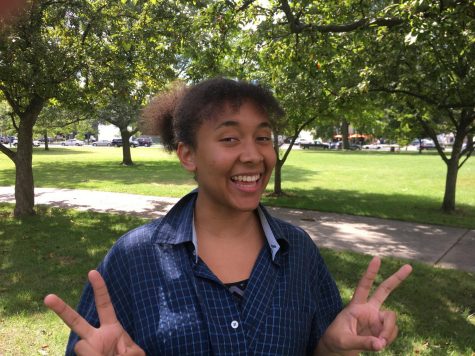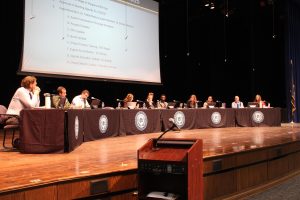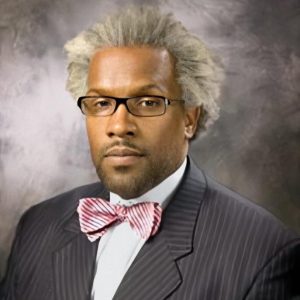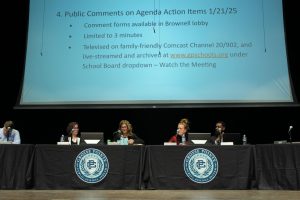Meet the candidates: who’s running and why you should care
October 22, 2018
On Nov. 6, thousands of Grosse Pointe residents will vote on seven candidates to decide which three will begin a four-year term on the Grosse Pointe Public School System school board.
While the debate over policy has been a focal point of the election, each of the candidates sees themselves adding something beneficial to the new board. In addition to being a member of the Michigan Association of School Boards, Margaret Weertz said she should also be re-elected because of her track record.
“Last time I was running on who I am and people didn’t know who I was or what I had to offer; this time I’m running on what I’ve done,” Weertz said. “I have a really good record of having saved the district money, improving our fund balance from five to 10 percent over four years and from passing a policy that saves us 400k to 500k dollars a year going forward.”
Both Wendy Saigh and Christian Fenton said that their campaigning has revolved around meeting the people of the Grosse Pointes to spread the word about the issues this election.
“My (campaign) strategy is to try to get out and meet as many people as I can, try to get the word out and provide as much information as I can so that people have the whole story,” Saigh said. “I want voters to have as much information as they can possibly have before they walk into that voting room.”
Brian Summerfield, who is the current school board president, said he should be re-elected in order to finish the work he started four years ago.
“I want to leave the board and district in a position where we’re not constantly struggling with the idea of cutting pay or cutting teachers or cutting programs,” Summerfield said. “It’d be nice to have the financial situation be such that we’re just focusing on trying to make improvements for better educational programs.”
While they may hold different opinions, all of the candidates agree that there is specific importance to this election because of the bond proposal. According to incumbent Summerfield, there is no other way to fund the capital improvements in our school than the bond.
“(The bond is) the only way to do it unless you want to cut programs, cut staff pay and/or cut staff,” Summerfield said. “By cutting staff you would end up increasing class size.”
In addition to Summerfield, Weertz, Fenton and Chris Lee are running in support of the bond. Weertz, current vice president, said the making of this bond has been in motion for 15 months, with a dozen town hall meetings and an inspection open to the community.
“It was a completely open and transparent process, so I support the process that happened,” Weertz said. “I support that it involved the community and I honor their decisions.”
Among those against the bond are John Shook and Wendy Saigh, both of whom ran in 2016 but were not elected and cited the bond as a primary reason to get involved in this year’s race.
“There’s still a lot of information needed and a lot more analysis in order to get the best bond package that we can to offer to the taxpayers,” Saigh said. “If we need a bond at all I think it’s down the road a bit.”
Shook said he and Saigh bring a different perspective to the bond-at-any-cost type attitude and have a different way of doing it.
“The accounting and the planning and the accountability by the current administration has certainly come under the microscope,” Shook said. “I’ve worked with an awful lot of business professionals in the Grosse Pointes– parents, there’s a couple of teachers that we’ve met with– and there certainly needs to be a return to fiscal responsibility.”
Shook said that it is up to the administration to tighten their belts, and believes that can be done without causing too much trouble.
“Are there things that need to get done? Sure,” Shook said. “But it’s no different than our parents living in the homes we did: they painted, they replaced a faucet, fixed a door, changed a lightbulb. You don’t need $183 million of the taxpayers’ money to do those types of things.”
However, Summerfield said that the $111 million earned from the bond is not enough to cover the cost of all the improvements that must be made throughout the district.
“Right now we have a sinking fund of $2.5 million, that’ll give us $25 million over the next 10 years, and we have about 176 mill dollars worth of capital improvements that need to be done in the next 10 years,” Summerfield said. “That’ll take care of the projects that we should be doing in the next three years.”
Lee said many in the anti-bond camp are adamant and not willing to keep an open mind towards the bond.
“It’s pretty clear to see that opponents of the bond are dug into their positions, but this bond was created by some extremely thoughtful dedicated intelligent people, and they just nitpick away and try to create issues,” Lee said. “I’ve done my best to be civil in my actions towards the opposition, but it’s getting difficult.”
Another pressing issue has been the proposal of certain buildings being shut down in order to address the consistent declining enrollment in the district, according to Summerfield.
“There doesn’t seem to be a lot of disagreement about closing an administration building, but nothing has happened yet,” Saigh said. “The buildings where kids are actually being taught, those are decisions that have to be made once we actually have all the facts in front of us, and we don’t have that yet.”
According to Saigh, because the national live birth rate is down, the Grosse Pointe School System enrollment is being directly impacted; every year there is a decrease of 100 students enrolled, which equates to roughly $1 million less for the district.
“I think if the population continues to decline like it’s projected, we’re going to have to address the issue, and that will involve getting the community together to figure out what’s the best way to reconfigure our schools to manage the situation,” Summerfield said. “We’d be wanting to look at all of our buildings, which ones are the best to educate the current student population, where the demographics are situated, among other things.”
Fenton said you shouldn’t assume who’ll be elected based on the number of lawn signs you can see throughout the city.
“I think all the seats are open, and it’s a tough campaign,” Fenton said. “You never know when you get to the ballot box who’s going to vote which way.”















































































